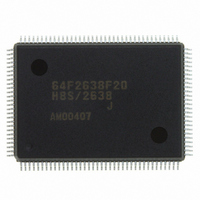HD64F2638F20J Renesas Electronics America, HD64F2638F20J Datasheet - Page 587

HD64F2638F20J
Manufacturer Part Number
HD64F2638F20J
Description
IC H8S MCU FLASH 256K 128-QFP
Manufacturer
Renesas Electronics America
Series
H8® H8S/2600r
Specifications of HD64F2638F20J
Core Processor
H8S/2600
Core Size
16-Bit
Speed
20MHz
Connectivity
CAN, SCI, SmartCard
Peripherals
Motor Control PWM, POR, PWM, WDT
Number Of I /o
72
Program Memory Size
256KB (256K x 8)
Program Memory Type
FLASH
Ram Size
16K x 8
Voltage - Supply (vcc/vdd)
4.5 V ~ 5.5 V
Data Converters
A/D 12x10b; D/A 2x8b
Oscillator Type
Internal
Operating Temperature
-40°C ~ 85°C
Package / Case
128-QFP
Lead Free Status / RoHS Status
Contains lead / RoHS non-compliant
Eeprom Size
-
Available stocks
Company
Part Number
Manufacturer
Quantity
Price
Company:
Part Number:
HD64F2638F20J
Manufacturer:
PENESAS
Quantity:
252
- Current page: 587 of 1512
- Download datasheet (9Mb)
H8S/2639, H8S/2638, H8S/2636,
H8S/2630, H8S/2635 Group
With the above processing, interrupt servicing or data transfer by the DTC* is possible.
If reception ends and the RDRF flag is set to 1 while the RIE bit is set to 1 and interrupt requests
are enabled, a receive data full interrupt (RXI) request will be generated. If an error occurs in
reception and either the ORER flag or the PER flag is set to 1, a transfer error interrupt (ERI)
request will be generated.
If the DTC* is activated by an RXI request, the receive data in which the error occurred is
skipped, and only the number of bytes of receive data set in the DTC* are transferred.
For details, see Interrupt Operation and Data Transfer Operation by DTC* followings.
If a parity error occurs during reception and the PER is set to 1, the received data is still
transferred to RDR, and therefore this data can be read.
Notes: For block transfer mode, see section 13.3.2, Operation in Asynchronous Mode.
Mode Switching Operation: When switching from receive mode to transmit mode, first confirm
that the receive operation has been completed, then start from initialization, clearing RE bit to 0
and setting TE bit to 1. The RDRF flag or the PER and ORER flags can be used to check that the
receive operation has been completed.
When switching from transmit mode to receive mode, first confirm that the transmit operation has
been completed, then start from initialization, clearing TE bit to 0 and setting RE bit to 1. The
TEND flag can be used to check that the transmit operation has been completed.
Fixing Clock Output Level: When the GM bit in SMR is set to 1, the clock output level can be
fixed with bits CKE1 and CKE0 in SCR. At this time, the minimum clock pulse width can be
made the specified width.
Figure 14-8 shows the timing for fixing the clock output level. In this example, GSM is set to 1,
CKE1 is cleared to 0, and the CKE0 bit is controlled.
REJ09B0103-0800 Rev. 8.00
May 28, 2010
* The DTC is not implemented in the H8S/2635 Group.
SCK
Figure 14-8 Timing for Fixing Clock Output Level
Specified pulse width
SCR write
(CKE0 = 0)
SCR write
(CKE0 = 1)
Specified pulse width
Section 14 Smart Card Interface
Page 537 of 1458
Related parts for HD64F2638F20J
Image
Part Number
Description
Manufacturer
Datasheet
Request
R

Part Number:
Description:
KIT STARTER FOR M16C/29
Manufacturer:
Renesas Electronics America
Datasheet:

Part Number:
Description:
KIT STARTER FOR R8C/2D
Manufacturer:
Renesas Electronics America
Datasheet:

Part Number:
Description:
R0K33062P STARTER KIT
Manufacturer:
Renesas Electronics America
Datasheet:

Part Number:
Description:
KIT STARTER FOR R8C/23 E8A
Manufacturer:
Renesas Electronics America
Datasheet:

Part Number:
Description:
KIT STARTER FOR R8C/25
Manufacturer:
Renesas Electronics America
Datasheet:

Part Number:
Description:
KIT STARTER H8S2456 SHARPE DSPLY
Manufacturer:
Renesas Electronics America
Datasheet:

Part Number:
Description:
KIT STARTER FOR R8C38C
Manufacturer:
Renesas Electronics America
Datasheet:

Part Number:
Description:
KIT STARTER FOR R8C35C
Manufacturer:
Renesas Electronics America
Datasheet:

Part Number:
Description:
KIT STARTER FOR R8CL3AC+LCD APPS
Manufacturer:
Renesas Electronics America
Datasheet:

Part Number:
Description:
KIT STARTER FOR RX610
Manufacturer:
Renesas Electronics America
Datasheet:

Part Number:
Description:
KIT STARTER FOR R32C/118
Manufacturer:
Renesas Electronics America
Datasheet:

Part Number:
Description:
KIT DEV RSK-R8C/26-29
Manufacturer:
Renesas Electronics America
Datasheet:

Part Number:
Description:
KIT STARTER FOR SH7124
Manufacturer:
Renesas Electronics America
Datasheet:

Part Number:
Description:
KIT STARTER FOR H8SX/1622
Manufacturer:
Renesas Electronics America
Datasheet:












